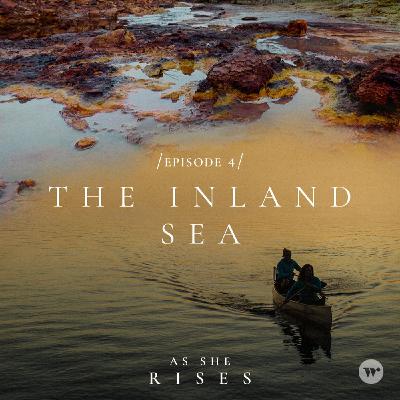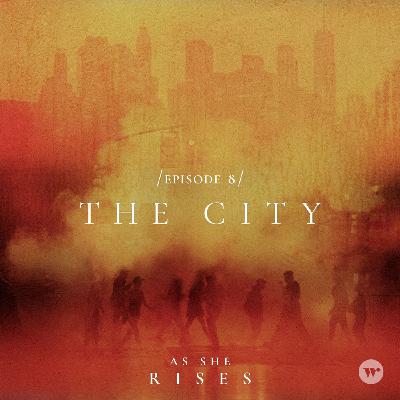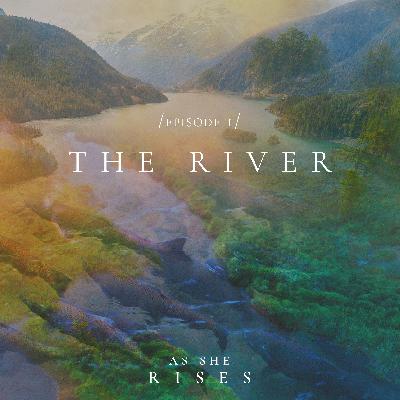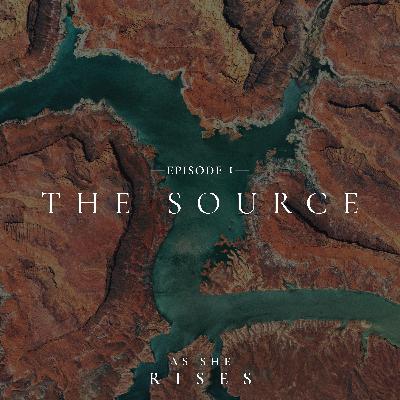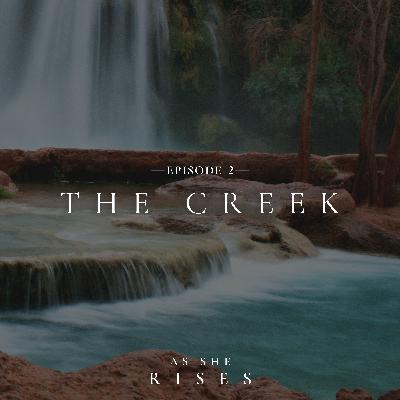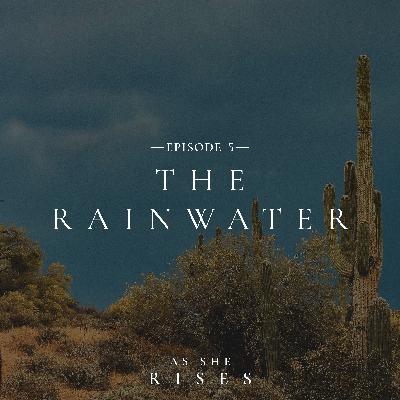Discover As She Rises
As She Rises

As She Rises
Author: Wonder Media Network
Subscribed: 9,222Played: 29,934Subscribe
Share
© 2022 Wonder Media Network
Description
As She Rises brings together local poets and activists from throughout North America to depict the effects of climate change on their home and their people. Each episode carries the listener to a new place through a collection of voices, local recordings and soundscapes. Stories span from the Louisiana Bayou, to the tundras of Alaska to the drying bed of the Colorado River. Centering the voices of native women and women of color, As She Rises personalizes the elusive magnitude of climate change.
The upcoming Season 3 of As She Rises is hosted by Leah Thomas, eco-communicator, author, and founder of the non-profit Intersectional Environmentalist. This season, As She Rises is traversing the Colorado River Basin. Each episode focuses on a different corner of the basin, beginning in the river’s reservoirs on the borders of Arizona and Utah, and finishing in the dry delta in Mexico – understanding water through a new lens and centering stories of resilience in the face of the drought.
The upcoming Season 3 of As She Rises is hosted by Leah Thomas, eco-communicator, author, and founder of the non-profit Intersectional Environmentalist. This season, As She Rises is traversing the Colorado River Basin. Each episode focuses on a different corner of the basin, beginning in the river’s reservoirs on the borders of Arizona and Utah, and finishing in the dry delta in Mexico – understanding water through a new lens and centering stories of resilience in the face of the drought.
23 Episodes
Reverse
As She Rises is a new show from Wonder Media Network that aims to personalize the elusive magnitude of climate change. Follow Wonder Media Network:WebsiteInstagramTwitter
In New Orleans, there is a time before the storm, and a time after. How does one keep up with change in a state losing a football field’s worth of land every hour and a half? On a street where a neighbor’s porch is built 12 feet off the ground? Take Action:The Gulf Coast Center for Law and Policy advances structural shifts toward ecological equity and climate justice in Gulf South communities of color on the frontline of climate change. You can donate to or volunteer with the GCCLP and Colette’s work at GCCLP.org.Join the efforts of the Gulf South for a Green New Deal at GulfSouth2GND.org. Find regional movements and events at GulfSouth4GND.org/regional-actions.Support Jerika’s poetry and book, “Swole,” at FuturePoem.com.Join efforts to put pressure on world leaders, at COP26 and beyond:Support SheChangesClimate, which is trying to get more women in top-level leadership at COP26 and other delegations around the world.Check out Greenpeace’s campaign: you can get involved with a local volunteer group in the UK or sign the Greenpeace petition.Donate to local aid groups organizing for Hurricane Ida and COVID-19 relief for the city of New Orleans and surrounding communities:Imagine Water Works advocates for "living with water" and works at the intersections of reducing risk from flooding, pollution, and natural hazards, prioritizing those who are systemically forgotten or pushed to the margins.Our Voice Nuestra Voz (#BlackAndBrownGetDown Community Defense Fund) organizes parents to expand quality educational access for students in New Orleans.House of Tulip is a community land trust creating housing solutions for trans and gender non conforming people in Louisiana:Bvlbancha Collective is an Indigenous mutual aid collective working in and for Bvlbancha, the original Chahta name for New Orleans.New Orleans Musicians' Clinic provides comprehensive medical care and social services to local musicians, performing artists, cultural workers, and tradition bearers.United Houma Nation Relief supports the efforts and general daily operations of the United Houma Nation.Follow Wonder Media Network:WebsiteInstagramTwitter
In the land we know as Alaska, a poet considers a melting landscape also ablaze. What does it mean to live in a “sepia-toned” world, to be forced to distance your ties to your culture, and to truly understand that what happens to the land also happens to the people? “June really isn’t June anymore / is it?” In this episode, we visit the land currently known as Alaska. Joan Naviyuk Kane, Iñupiaq poet and scholar, joins us with the title poem of her collection “Hyperboreal” and her experience watching the landscape she grew up in change drastically because of climate change. Local activist Enei Begaye centers an Indigenized perspective as she works toward a more sustainable and just future for the native communities around her, and Siqiniq Maupin works to strengthen Iñupiaq cultural identity despite the poisonous grip of the oil and gas industry on her homeland. Take action:Support Enei’s work at NativeMovement.org: volunteer, donate, sign petitions and more.SILA, Sovereign Iñupiat for a Living Arctic, has similar opportunities to support organizing efforts to protect and preserve Alaska’s North Slope. You can join their monthly meetings as a respectful member to learn more about frontline efforts.You can find more of Joan’s work and poetry books on her website. Her newest book, “Dark Traffic,” is out now.Join efforts to put pressure on world leaders, who should be taking radical action on climate change, at COP26 and beyond:Support SheChangesClimate, which is trying to get more women in top-level leadership at COP26 and other delegations around the world.Check out Greenpeace’s campaign: you can get involved with a local volunteer group in the UK or sign the Greenpeace petitionFollow Wonder Media Network:WebsiteInstagramTwitter
“It’s not the same, knowing the theory of climate disaster, and then actually living through it.”There is a fissure on the island of Puerto Rico-- one widened in the wake of massive storms, earthquakes, COVID, and quickened by the dizzying pace of climate change.In this episode, bilingual poet Raquel Salas Rivera finds hope in a poem titled “nota para una amiga que desea suicidarse después del huracán” and tells us about the ripples of trauma Maria left behind. Local activist Amira Odeh recalls being unable to recognize her own home after the storm and how she’s working to rebuild PR.Take Action:Support Amira’s work at the Caribbean Youth Environment Network Puerto Rico Chapter at CYEN.orgFind more of Raquel’s work at RaquelSalasRivera.netJoin efforts to put pressure on world leaders, at COP26 and beyond:Support SheChangesClimate, which is trying to get more women in top-level leadership at COP26 and other delegations around the world.Check out Greenpeace’s campaign: you can get involved with a local volunteer group in the UK or sign the Greenpeace petitionFollow Wonder Media Network:WebsiteInstagramTwitter
In Northern Minnesota, over eleven hundred glassy lakes create a vast inland sea. The water is so clean that canoers can drink straight from the lakes. What will it take to protect this beautiful and life-giving landscape from human threat?In this episode, we are transported to the Boundary Waters Canoe Area Wilderness of Minnesota. Kim Blaeser, former Wisconsin Poet Laureate, reads her poem “Eloquence of Earth.” And she speaks about how the threat to this water is a threat to Anishinaabe people. Becky Rom, national chair of the Campaign to Save the Boundary Waters, grew up navigating these waters. Today she’s fighting to protect the landscape she holds dear from sulfide-ore copper mining.Take Action:In April of 2021, Congresswoman Betty McCollum introduced The Boundary Waters Protection and Pollution Prevention Act. Find your local congressperson here, regardless of the state you live in, and urge them to support this legislation. Here’s a script you can take pointers from.You can find more of Kim’s poetry and writing on her websiteYou can support the grassroots movement and the work Becky is doing at savetheboundarywaters.org.Join efforts to put pressure on world leaders, at COP26 and beyond:Support SheChangesClimate, which is trying to get more women in top-level leadership at COP26 and other delegations around the world.Check out Greenpeace’s campaign: you can get involved with a local volunteer group in the UK or sign the Greenpeace petition.Follow Wonder Media Network:WebsiteInstagramTwitter
The most visited stretch of beach in Hawai’i should be underwater. Instead, it’s kept afloat by over thirty thousand tons of sand-- sand that drifts out to sea every 5 to 10 years before it's replaced yet again. Before the Ala Wai canal drained the watershed, Waikiki sustained a native population of over a million, and fed and nurtured its diverse wildlife in a self-sustaining system. Today, king tides are trying to reclaim Waikiki.“This is not the end of civilization, but a return to one. Only the water insisting on what it should always have, spreading its liniment over infected wounds. Only the water rising above us, reteaching us wealth, and remembering its name.”In this episode, we visit the man-made beach of Waikiki. Poet Brandy Nālani McDougall reads from her collection “The Salt-Wind, Ka Makani Paʻakai” and tells us of Hawai’i before the Ala Wai. Frankie Koethe, community outreach liaison for the Ko’olau Mountains Watershed Partnership, explains the intricacies of the Waikiki watershed and the dangers it faces in an era of urbanization.Take Action:You can find more of Brandy’s poetry and writing on Bookshop.orgYou can support the Ko’olau Mountains Watershed Partnership and sign up to volunteer at koolauwatershed.orgJoin efforts to put pressure on world leaders, at COP26 and beyond:Support SheChangesClimate, which is trying to get more women in top-level leadership at COP26 and other delegations around the world.Check out Greenpeace’s campaign: you can get involved with a local volunteer group in the UK or sign the Greenpeace petition.Follow Wonder Media Network:WebsiteInstagramTwitter
This land has always been on fire. But the destructive power of these flames is new. There was a time before, and there is a time ahead, when fire clears the way for new growth in the foothills. “So many particular precious, irreplaceable lives that despite ourselves, we're inhaling.”In this episode, we visit the land currently known as Northern California. Molly Fisk, inaugural poet laureate of Nevada County, California, recalls the devastation of the Camp Fire and the trepidation that follows rebuilding in the scorched tracks of a wildfire. Margo Robbins, Yurok Tribal member and executive director of the Cultural Fire Management Council, explains the ecosystem’s intricate connection to fire and the role prescribed burns played in this area’s past, present, and future.Take Action:You can find more of Molly’s writing at mollyfisk.com. California Fire & Water, an anthology project helping kids across California write poems about the climate crisis, is out now.Support Margo’s work at the Cultural Fire Management Council at CulturalFire.org.Join efforts to put pressure on world leaders, at COP26 and beyond:Support SheChangesClimate, which is trying to get more women in top-level leadership at COP26 and other delegations around the world.Check out Greenpeace’s campaign: you can get involved with a local volunteer group in the UK or sign the Greenpeace petition.Follow Wonder Media Network:WebsiteInstagramTwitter
In Oklahoma, a fight is playing out that could finally recognize tribal sovereignty, especially over how to manage the environment. This could set a precedent for the rest of the country, and affect our climate. But the powers that be won’t let go easily.In this episode we visit the plains of eastern Oklahoma. Joy Harjo, the United States poet laureate, reads her poem “Speaking Tree” and shares what happens when we lose touch with traditions that center care for the earth. Casey Camp-Horinek, a matriarch and drum keeper of the Ponca Nation of Oklahoma, is an environmental activist fighting to free her community from the clutches of the oil and gas industry. She reminds us that we are all bound in responsibility to each other to care for this earth, and that Indigenous voices should be at the forefront of climate discussions and policy change.Take Action:Joy Harjo is the author of nine books of poetry, including She Had Some Horses, and a memoir, Crazy Brave. In September 2021, she came out with a new memoir titled Poet Warrior. If you want to check out more of Joy Harjo’s work go to joyharjo.comSupport Movement Rights at movementrights.org which elevates traditional Indigenous ecological knowledge to align our laws with nature’s needs, and fights for more tribal sovereignty.Follow Wonder Media Network:WebsiteInstagramTwitter
“The worst crime I know men have committed is to turn nature into an oppressor.”In the city, the heat is suffocating: it reverberates off buildings, seeps through the concrete, and bounces off glass back down onto a city of 8.4 million people. New York City is hotter than ever before-- but it’s felt differently from neighborhood to neighborhood. Today, we’re ending our season in the land currently known as New York, where increasing heat exacerbates the risks already felt by communities bearing the brunt of a changing climate.Jade Lozada, a college student and climate organizer, recites her poem “The Worst Crime,” commissioned for the Natural Resources Defense Council, and explains the dual role heat plays in bringing her closer to home, and making home uninhabitable. Dr. Melissa Barber, co-founder of South Bronx Unite, studies hyper localized heat islands and protests corporate intervention with community-generated solutions to the climate crisis. Take Action:Jade’s poem, “The Worst Crime,” was originally published by NRDC.org. You can find her poem, as well as those of three other writers, in this article.Jade was one of the finalists for Climate Speaks 2020, a climate arts program that is part of The Climate Museum, which aims to spark dialogue and action on the climate crisis. Support Jade’s work, as well as other climate poets, at ClimateSpeaks.orgSouth Bronx Unite brings together neighborhood residents, community organizations, academic institutions and allies to improve and protect the social, environmental, and economic future of Mott Haven and Port Morris. Support Dr. Barber and South Bronx Unite at SouthBronxUnite.orgFollow Wonder Media Network:WebsiteInstagramTwitter
As She Rises is back for a second season to celebrate both Earth and Poetry Month. Throughout April, we’re telling the stories of climate progress that give us the hope we need to keep going.
Straddling the border between the US and Canada, the Skagit Watershed is a haven for sea creatures. The “Magic Skagit” is in peril: the ways of life it has sustained for the communities along its shores are faltering under years of settler disruption, and upstream, its headwaters originate in a pool of unprotected land threatened by extractive industries. Still, there’s hope in numbers: a cross-border coalition of federal, Tribal, and political leadership on all levels, dedicated to saving the Skagit River. “You must have cleaned a lot of fish.” I say. // “I think we cleaned out all of Puget Sound…”Won’t be long before all the fish are gone, then the cannery will go, and all we’ll have is hunger and sorrow.”This season, we’re excited to collaborate with The Slowdown, hosted by Ada Limón. From American Public Media – and in partnership with The Poetry Foundation – The Slowdown delivers a different way to see the world: through poetry. Listen here. Take Action:Follow Rena’s work, and get her new collection of poetry, at RenaPriest.comLearn more about Amy’s work with the Swinomish Indian Tribal Community at Swinomish-nsn.govStay up to date with Washington Wild’s conservation efforts at WAWild.org
Far out in the waters of the South Pacific are the Samoan Islands. They make up an island paradise, a contested territory, an ecological haven. They might also hold a key in the fight to protect endangered coral reefs.“steady us mother/ your eye lights the wayyour heart moves our bloodyour hand steers our boat.”Welcome to season 2 of As She Rises. In this episode, we visit the islands of Samoa. Poet Caroline Sinavaiana Gabbard reads her poem “Sā Nafanuā” and discusses how language and ancestral stories can guide us in the present. Motusaga Vaeoso, who studies corals with the Coral Reef Advisory Group of American Samoa, tells us about resilient coral species and the important role communities play in sustaining conservation efforts. She reminds us that there is a lot left to fight for.Take Action:Read Caroline’s poetry collection, Alchemies of Distance and her other book mohawk/samoa: transmigrationsYou can follow Motu’s work through the National Oceanic and Atmospheric Administration website. Keep up with the state of Samoa’s coral reefs at americansamoa.noaa.gov.
Nestled in the Northwestern corner of present-day New Mexico is the Greater Chaco Region: home to thousands of Diné and Puebloean families. It's also one of the most intense concentrations of oil wells in the country, designated an “energy sacrifice zone” by the Nixon administration in the 1970s. Now, a group of activists who recognize the land’s inherent importance, and who themselves have built lives on and around it, are changing the way this land is leased out—and might preserve this land for good.“Oh, how I’ve missed you. To think I was away for so long / and you were always there / waiting on the red earth / to hold yourself open / and offer to carry my burden.”Take Action:Find more of Laura’s work at LauraTohe.comFollow and take part in the campaign to protect the Greater Chaco Region at PuebloActionAlliance.org
As climate change progresses, more people will be forced from their homes and into exploitative environments. In the United States, this is particularly true of farmworkers.The climate crisis is, undeniably, a labor issue too.“like you i woke up in the dark. but i was reaching for animals, trying to beat the heat. like you sunrise usually found me in the middle of doing something. i didn’t call it prayer, but i did believe that if i did it every day we would exist.”In today’s episode, we hear the poet Alexis Pauline Gumbs read from her book, “DUB”, as she unlearns the separation between her work and that of her great-grandfather’s. She shows us how poetry can help us imagine another way of relating to life on earth. We then travel to the agricultural fields of Immokalee, Florida. where Lupe Gonzalo is a senior staff member at the Coalition of Immokalee Workers. She tells us about her experience working tomato fields, the work she does now fighting for farmworker rights, and the need to unlearn the systems of separation between land, food, and people. Take Action:Find more of Alexis Pauline Gumbs’ work at alexispauline.comTo learn more about the Coalition of Immokalee Workers go to ciw-online.orgFollow them on twitter @ciw to learn about upcoming marches and boycotts and take part.
Premiering May 1 wherever you get your podcasts. As She Rises is back for its third season with a new host: Leah Thomas, founder of The Intersectional Environmentalist. This season, As She Rises is traversing the Colorado River Basin downstream, understanding water through a new lens and centering stories of resilience in the face of the drought. If you're interested in learning more about the Colorado River Crisis, check out High Country News, a nonprofit, reader-supported publication that has been covering the Western US for more than 50 years. To support their work or for a free trial, go to HCN.org.
Lake Powell is long and thin. It snakes through the red-desert, running southwest through Utah, ending at the top of Arizona. From above, it looks like a human artery. From the inside, it's idyllic. The water is crystalline. Every year, millions of people flock to the lake to fish, canoe, and hike. Today, Lake Powell is around a fifth of its original size. Pools that used to be deep enough to dive into have turned into puddles of mud. And as the water disappears, the forgotten canyon beneath reemerges. We’re starting our journey just south of Lake Powell, in the Navajo Nation. Over the years, the U.S. government has signed a number of treaties with the Navajo Nation, promising certain amounts of water, and water infrastructure. But, as they struggle to reallocate water in the face of drought, the government still tends to leave indigenous communities out of the conversation.Poet Kinsale Drake reads her poem, “after Sacred Water,” about how the U.S. government drowned an ecosystem to create a dam that is now shrinking fast. Emma Robbins, director of the Navajo Water Project, explains how her organization ensures households have running water, and that the Navajo Nation has a seat at the table. For More:Support Navajo Water ProjectDiscover more of Kinsale Drake’s poetryAs She Rises is a Wonder Media Network production. Follow Wonder Media Network on Instagram and Twitter. This season, we’re excited to collaborate with NRDC to drive action to combat the climate crisis and promote solutions to build a just and equitable future for all. Take Action:NRDC uses science, policy, law, and people power to confront the climate crisis, protect public health, and safeguard nature. Follow them on Twitter (@NRDC) and Instagram (@NRDC_org) to stay up to date on NRDC’s efforts and how you can get involved. Support NRDC’s fight to stop the illegal Willow oil drilling project and help end our dependence on fossil fuels at https://on.nrdc.org/3nBiNWKLearn more about NRDC’s work to protect the Colorado River Basin here.
The Havasupai tribe lives at the bottom of the Grand Canyon, in Supai Village. Just north of the village, a hidden aquifer turns into Havasu Falls, a waterfall that cascades into a pool of blue-green water. This water has sustained the Havasupai people for centuries, nourishing their crops, softening the harsh conditions of the desert, and serving as a place of reverence. But now, the Havasupai tribe’s water source is threatened by uranium mining. Carletta Tilousi is a member of the Havasupai tribal council’s anti-uranium committee. She explains their 30-year fight against what is now known as the Pinyon Plain Mine. Colleen Kaska, a former Havasupai tribal council member, reads a poem she wrote about the importance of water to her people. Take Action: On April 11, 2023 the Havasupai and other Southwest tribes announced their effort to designate the Grand Canyon area as a national monument. They are calling on the federal government to designate this area a permanently protected area, and in doing so, protect it from mining and other threats. You can learn how to support this effort by signing the petition here. As She Rises is a Wonder Media Network production. Follow Wonder Media Network on Instagram and Twitter.
Black Mesa is a high desert, arid, with few streams or rivers aboveground. Water tends to come from above or below: sometimes, as a gentle rain. Other times, a rushing monsoon. Navajo and Hopi people have called it home for thousands of years. Its water reservoirs— a complex system of underground pools called “aquifers”— sustain people, livestock, and agriculture on the plateau. More recently, that scarce resource fed the needs of Peabody Coal, an extractive industry that drained the Mesa dry over the last half century. Nicole Horseherder helped establish the non-profit Sacred Water Speaks with a clear goal: get Peabody Energy off the aquifer and bring water back to her community. Amber McCrary reads “Monsoon Musings,” a poem she wrote about the moments when heavy rains arrive in her desert homeland. For more:Support Nicole’s work with Sacred Water SpeaksDiscover more of Amber McCrary’s poetry As She Rises is a Wonder Media Network production. Follow Wonder Media Network on Instagram and Twitter. This season, we’re excited to collaborate with NRDC to drive action to combat the climate crisis and promote solutions to build a just and equitable future for all. Take Action:NRDC uses science, policy, law, and people power to confront the climate crisis, protect public health, and safeguard nature. Follow them on Twitter (@NRDC) and Instagram (@NRDC_org) to stay up to date on NRDC’s efforts and how you can get involved. Support NRDC’s fight to stop the illegal Willow oil drilling project and help end our dependence on fossil fuels at https://on.nrdc.org/3nBiNWKLearn more about NRDC’s work to protect the Colorado River Basin here.
In the southern valleys of California, lies a desert oasis known as the Salton Sea. The inland sea is picturesque— from afar. Up close, the beauty begins to fade. The sea is a result of diverting the Colorado River to the Imperial Valley for agriculture, and it’s filled with fertilizer, pesticides, and salt. Decades of drought have caused the sea to evaporate at a rapid pace, exposing the lakebed, unearthing toxins, and endangering nearby communities.Adriana Torres Ceja and Olivia Rodriguez Mendez are both residents of the Eastern Coachella Valley and graduates of the Youth Leadership Institute. They have seen firsthand the negative impacts of the shrinking sea. Adriana reads a poem she wrote about the Salton Sea, and Olivia talks about the documentary she helped make to ensure her community’s voices are heard while the future of the sea remains uncertain.For more: Watch Estamos AquíSupport the Youth Leadership InstituteIf you would like to learn more about Imagine5 and read some of their inspiring stories, please follow them on Instagram at @imagine5_official and sign up for their newsletter by visiting Imagine5.comAs She Rises is a Wonder Media Network production. Follow Wonder Media Network on Instagram and Twitter.
The Sonoran Desert, situated at the bottom edge of Arizona, stretches out into the haze of a horizon, rippled with heat. It’s fed by thin tributaries of the river and, more often, watered by sparse rains. It’s a place that, in theory, could seem pretty inhospitable. But the Tohono O’odham nation has survived and thrived there, thanks in part to traditional agricultural practices that are more relevant than ever as a drought looms ahead. Tohono O’odham poet Ofelia Zepeda reads “Pulling Down the Clouds.” Her poem describes the treasured practice of Saguaro harvesting. It’s a practice Maria Francisco’s family has been taking part in for generations. Maria explains how the harvest is a celebration of rain. But now, climate change has caused the rains and monsoon seasons to shift, so the harvests are shifting too. Amy Juan is the manager of San Xavier Co-op Farm, an operation meant to revitalize traditional agricultural practices. They’re healing the ties to the past that have been severed by colonial practices, and mending the paths towards the future as the climate inevitably changes.For more:Support San Xavier Cooperative Farm at sanxaviercoop.orgYou can read Ofelia Zepeda’s poetry in “Ocean Power: Poems from the Desert” and “Jewed'l-hoi/Earth Movements, O'Odham Poems.” If you would like to learn more about Imagine5 and read some of their inspiring stories, please follow them on Instagram at @imagine5_official and sign up for their newsletter by visiting Imagine5.comAs She Rises is a Wonder Media Network production. Follow Wonder Media Network on Instagram and Twitter.





